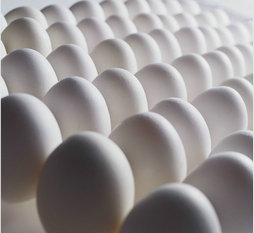-
(单词翻译:双击或拖选)
Save the Eggs
Vaccine makers crack the eggshell and inject the virus into the white stuff surrounding the yolk1. Then they reseal the egg, the embryo2 becomes infected, and the virus is allowed to copy itself trillions of times over. And they use eggs because eggs are easy to infect and are relatively3 cheap. Right?
M: Well,yeah,But...
W: But the problem with using eggs to make flu vaccines is that normally there are plenty of eggs to go around, but when there’s a sudden outbreak the eggs can run out pretty fast. And that’s one of the reasons why researchers are experimenting with a new way to grow flu vaccines.
Instead of infecting eggs, they’re trying to grow flu viruses in cultured human and animal cells. When an epidemic occurs, doctors could simply grow a large colony of cells, and then more easily develop enough vaccine.
And this method may not only save time, but also potentially produce more effective vaccines. Since the vaccine grown in cells may be better than caccine grown in the eggs at mimicking4 the flu virus that infects people.
疫苗生产商打碎蛋壳,把病毒注入蛋黄周围的蛋清里边。然后他们再把鸡蛋密封起来,这样鸡胚就被感染了,病毒就可以上万亿次的繁殖。他们使用鸡蛋培育疫苗是因为鸡胚很容易被感染而且还很便宜,是吧?

是的,但是...
使用鸡蛋培育流感疫苗的问题是,正常来说要有很多鸡蛋才行,但假如疾病突然发生,鸡蛋很快就会用完。那也是为什么研究员们正尝试培育流感疫苗新方法的原因之一。
他们正试图在人类和动物细胞里培育流感疫苗,而不是去感染鸡蛋。当传染病发生时,医生可以仅仅是培育一大群细胞,然后很轻易地生产足够的疫苗。
而且这种方法不仅节约时间,还能尽可能多地生产有效的疫苗,因为细胞里生长的疫苗在仿制流感病毒方面要比鸡蛋里的好。
 收听单词发音
收听单词发音
1
yolk

|
|
| n.蛋黄,卵黄 | |
参考例句: |
|
|
|
2
embryo

|
|
| n.胚胎,萌芽的事物 | |
参考例句: |
|
|
|
3
relatively

|
|
| adv.比较...地,相对地 | |
参考例句: |
|
|
|
4
mimicking

|
|
| v.(尤指为了逗乐而)模仿( mimic的现在分词 );酷似 | |
参考例句: |
|
|
|

















